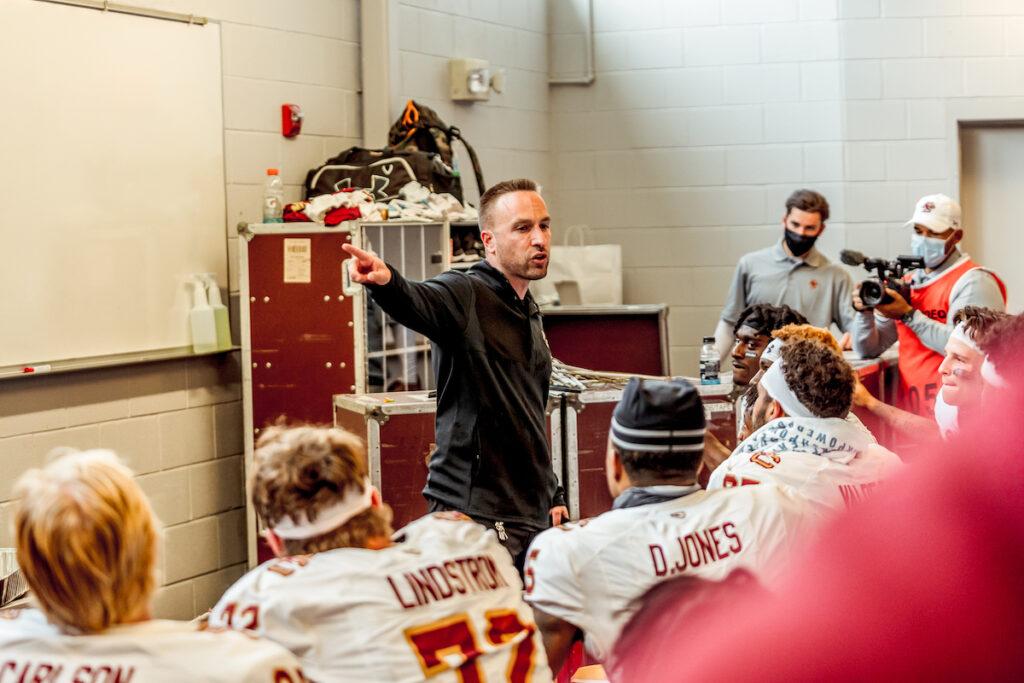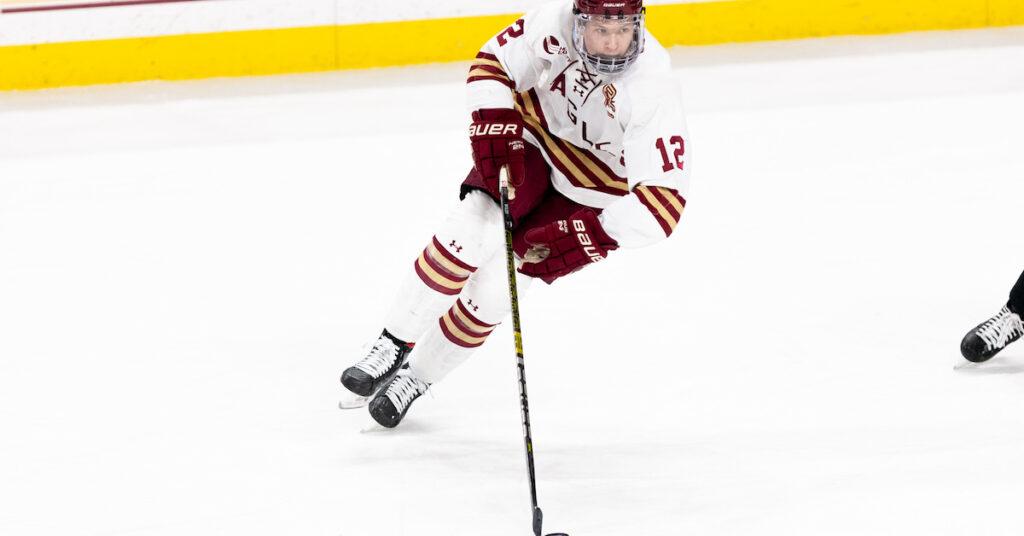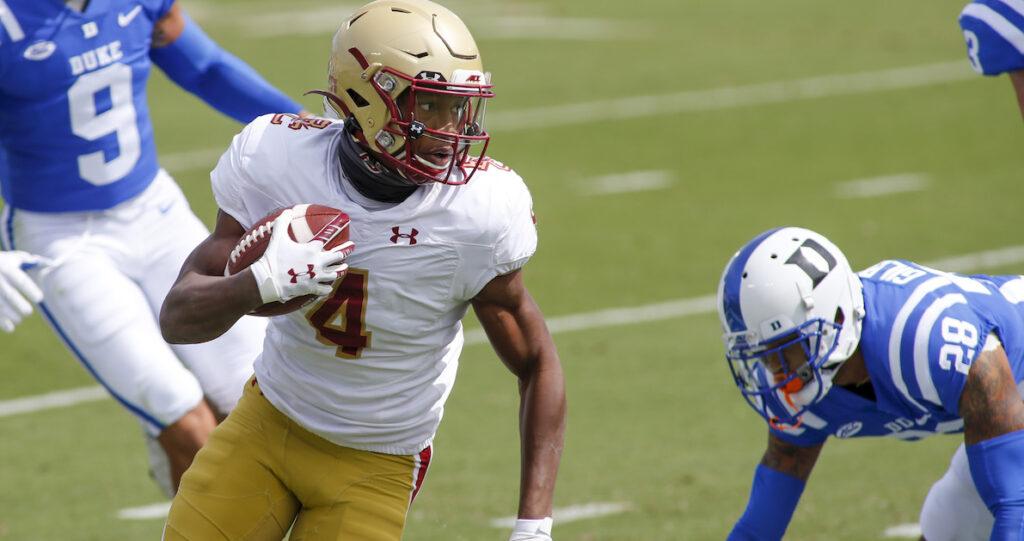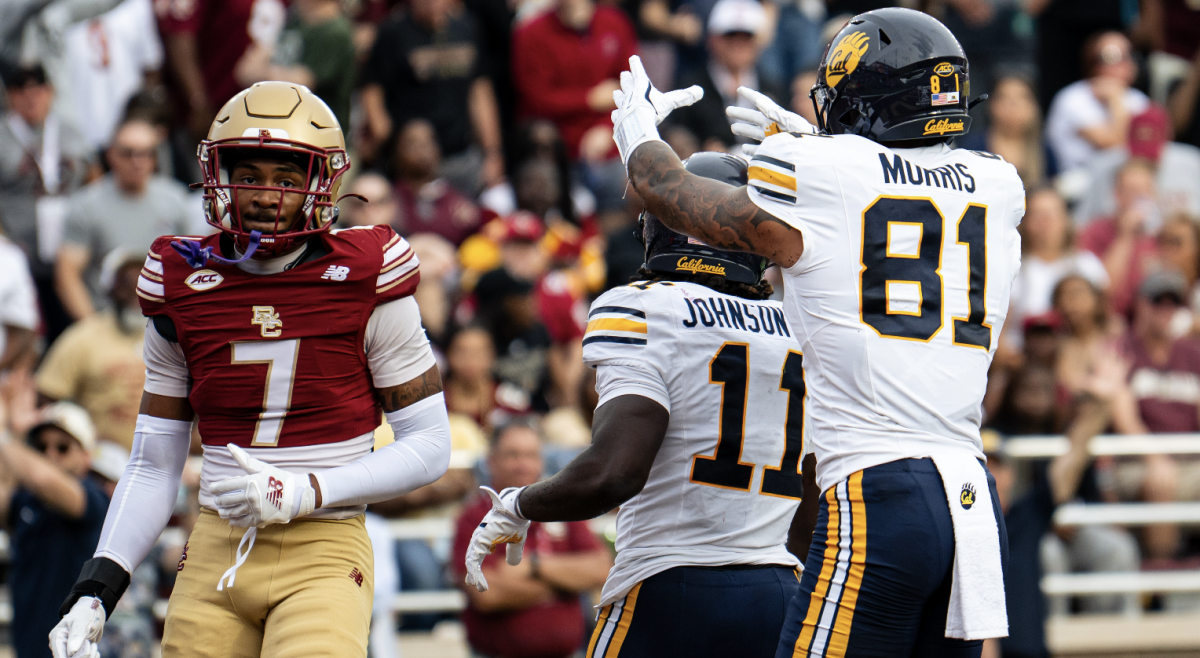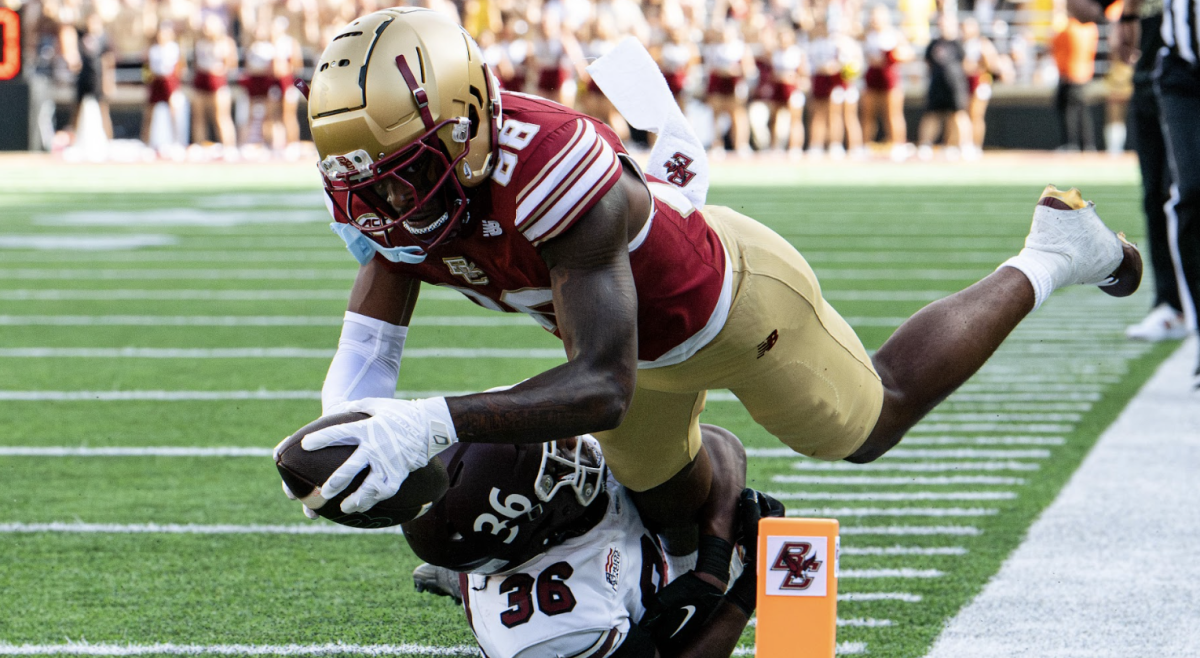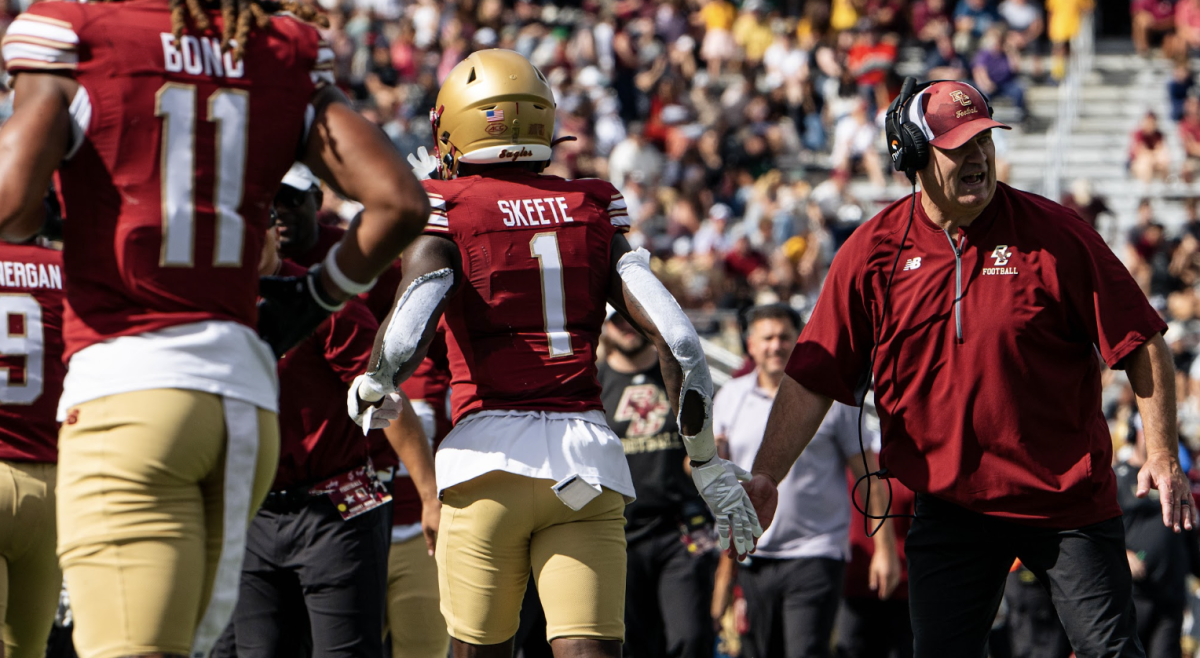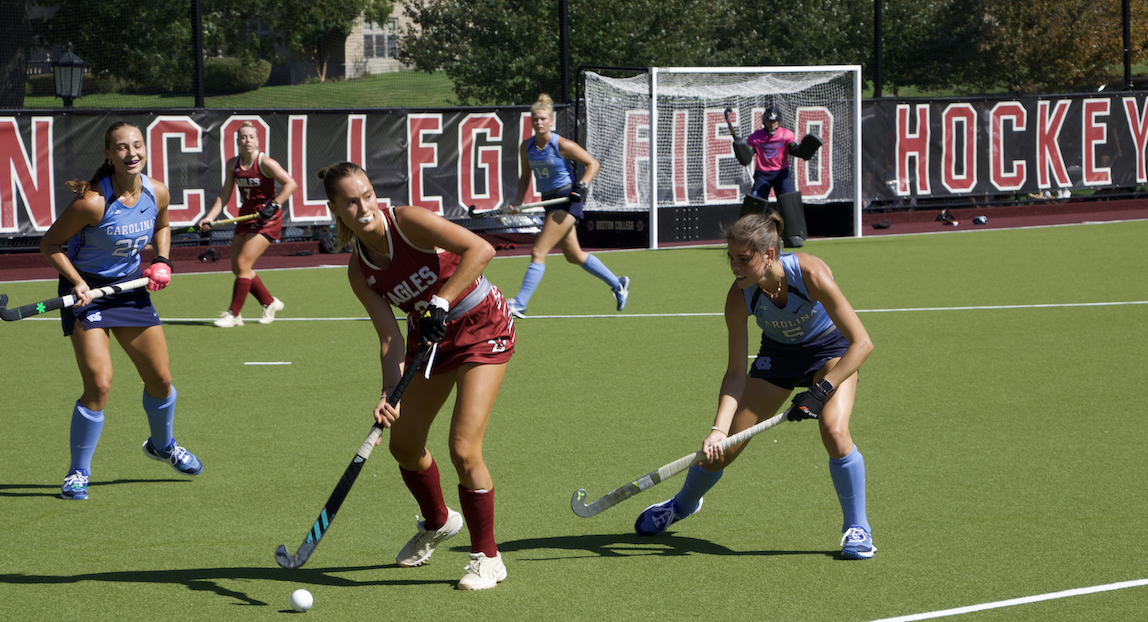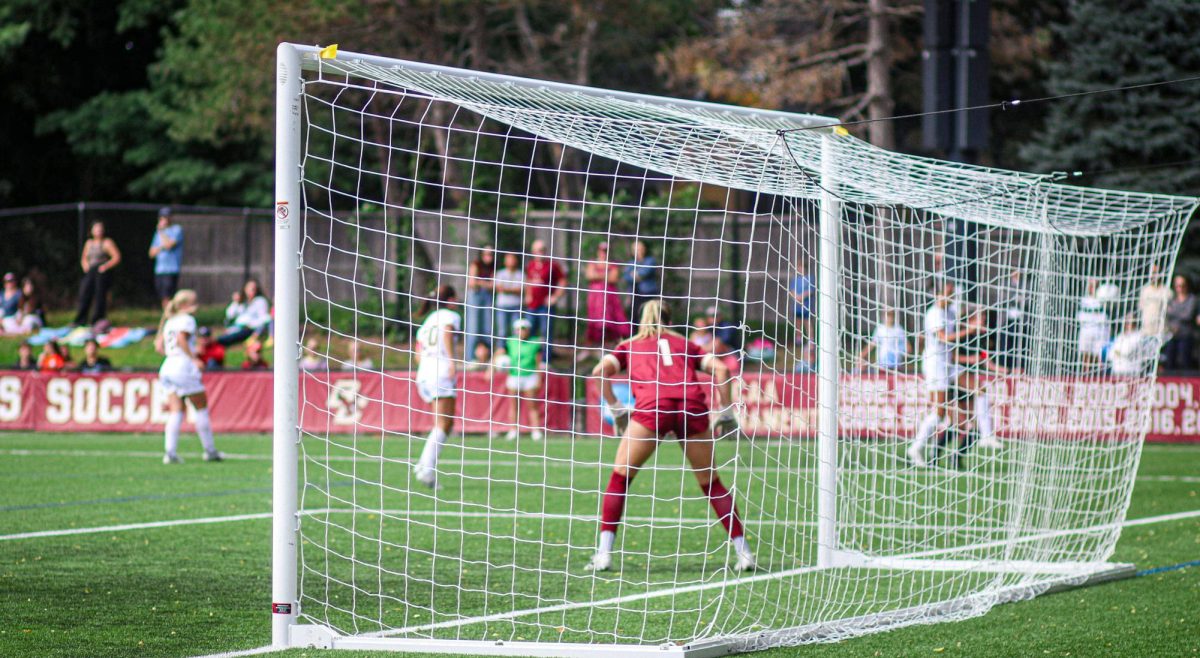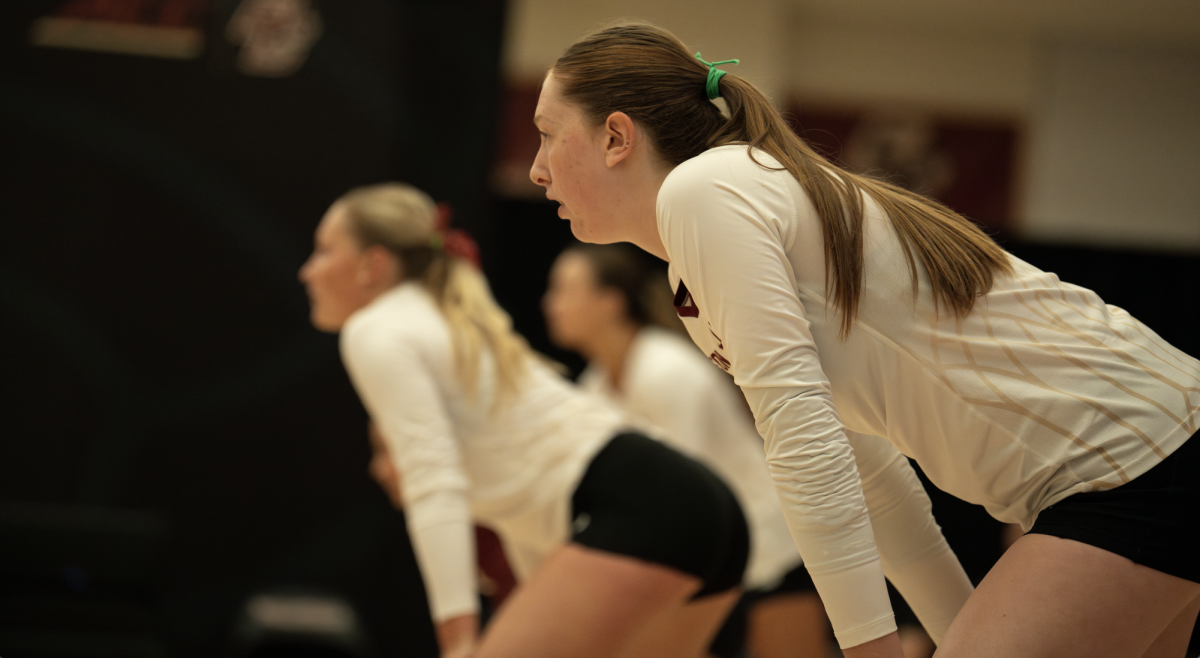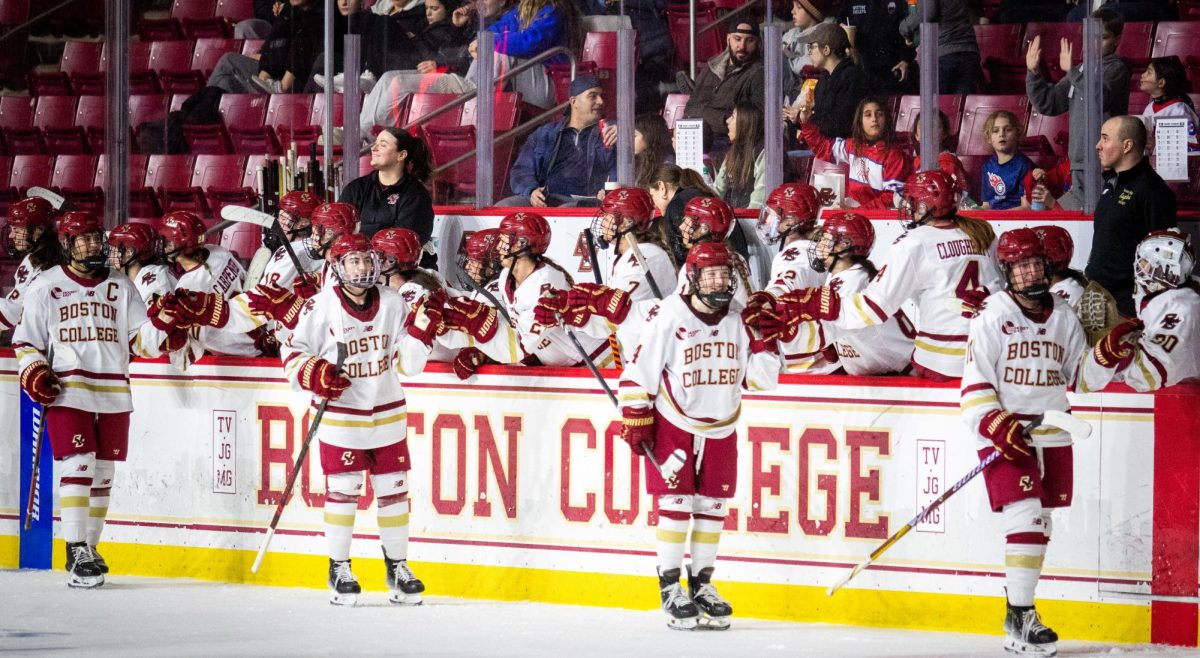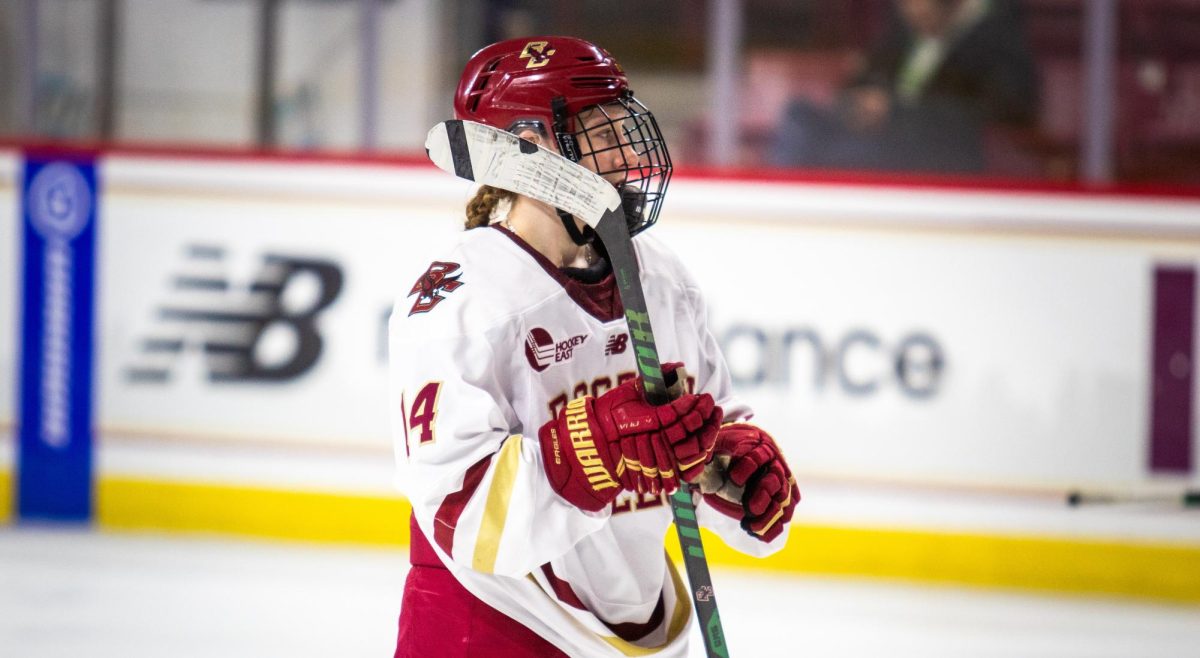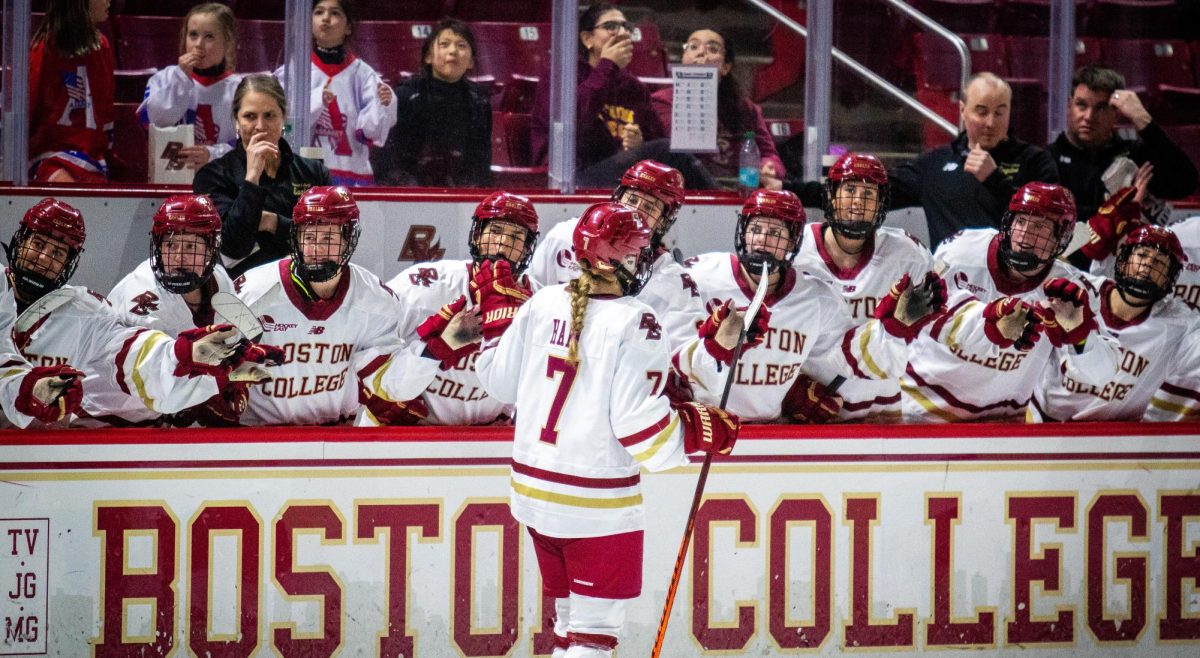Of all the things you’d expect to find in Fish Field House during Boston College’s preseason football team meetings, a basketball hoop is not one of them.
Yet, lo and behold, there it was, practically every day of the summer of 2020. Head coach Jeff Hafley and his staff ritualistically rolled the cumbersome hoop out onto the turf, and there it loomed, awaiting its next challenger.
Hafley would take turns picking a player or two, or maybe even an assistant coach, out of the physically distant crowd to go head to head in a basketball shooting contest—a sport that, in all likelihood, made them look like fish out of water.
“We just had to try to keep it light at times,” Hafley said. “I mean, with everything going on in the world, and COVID, and not being home … we just had to find ways to do other things, and I think we did a good job of that.”
While training camp in a normal year is usually spaced out throughout the summer, the COVID-19 pandemic made it so that this year, the Eagles went without seeing their families or “leaving their bubbles,” as Hafley described it, for months at a time.
“It probably felt like the longest training camp—the longest summer—in the history of football,” Hafley said.
Day after day, players would exhaust themselves in grueling practices, according to Hafley, and without the chance to venture off campus, there was little in the way of blowing-off-steam activities.
Thus, pre-meeting basketball was born. The ritual has since morphed into a number of new intrasquad competitions—including wiffle ball and O-Line punt-catch competitions—fostering community and a competitive spirit in a largely disconnected year.
Hafley arrived at BC with the obvious intent of righting the ship of a program that had previously been stuck in perpetual mediocrity through internal competition. And the solution, apparently, started with intramural games.
Though Hafley said wiffle ball perhaps isn’t his strong suit (“Usually I strike a few out, and I’ll give up some home runs,” he said), his adept ability to connect to his players and begin the arduous process of reversing the program’s course earned him The Heights’ 2020-21 Coach of the Year honor.

For as young as he is—the 42-year-old coach is one of the youngest in the FBS head coaching scene—Hafley is in no way short on experience. He’s got two decades of coaching under his belt, both at the collegiate level and in the NFL. In that time, he said, he’s learned a little something from every coach he’s worked with.
“Some coaches I’ve taken some great ideas [from], and other coaches, you know, I didn’t like what we did so I’ve created my own things,” Hafley said. “In my opinion, I’ve taken all the things that I’ve seen over the years and tried to formulate who I am as a head coach and how I want to run things in my philosophy.”
Hafley rattled off a list of a dozen coaches and what each of them has taught him, including big names such as Kyle Shanahan (“the details in his schemes”), Mike Pettine (“one of the best defensive coaches I’ve been around”), and Dave Wannstedt (“the way he treated his players and staff”).
Whether he realizes it or not, though, Hafley serves that same teaching role for his current staff.
“That’s what I do with Coach Haf every day,” BC defensive coordinator Tem Lukabu said. “I’m just learning off of his experiences, learning off of the decisions that he has to make, how he structures things, organizes things, and try to see how they would fit me or suit me moving forward.”
Hafley and Lukabu first met on the recruiting trail in 2008, according to Lukabu, and three years later, the pair—now the best of friends—worked together at Rutgers under Greg Schiano. Both worked on the defensive side of the ball, building the ninth-best passing defense in the country, which is where they’ve focused their careers since.
As BC’s head coach, though, Hafley’s had to learn how to adapt to essentially being in three places at once.
“On game day, I’m so involved in the defense and what’s going on and the adjustments,” Hafley said. “All of a sudden, I’ll realize I’m the head coach, and I’ve got to switch over to the headsets and go be with the offense.”
Though he describes the transition from phase to phase as somewhat hectic, it’s not the way Hafley comes across on the field.
From the Alumni Stadium press box six stories above the field, Hafley appears to pace coolly and almost ritualistically up and down the sideline. He rarely ventures onto the field, and he doesn’t even require a “get back coach” like the one that famously accompanies Los Angeles Rams head coach Sean McVay.
Whatever frenetic energy is undoubtedly coursing through Hafley’s veins on game day doesn’t present itself on the field.
“He’s really calm,” Lukabu said of Hafley’s appearance on game day. “He takes in information and he doesn’t just react. I think he gets the whole picture before he does say something or do something, and that’s his personality. He’s not reactionary.”

When he arrived at BC in January of 2020 just days after leading Ohio State on a run for the National Championship as the Buckeyes’ co-defensive coordinator, Hafley inherited a program stuck in a holding pattern of middling-at-best seasons.
In recent years, the BC program had depended on the talents of AJ Dillon in a run-first offense to little avail. In seven seasons under former head coach Steve Addazio, the Eagles never once registered more than seven wins. Plus, when Hafley arrived, Dillon had just declared his entry into the 2020 NFL Draft, making a shift to a pro-style game that much more important.
The turnaround Hafley created was almost immediate, though it isn’t apparent in the Eagles’ 6-5 record for the 2020 season. Instead, Hafley brought with him a shift in culture, both within his team and across the Heights. His “Get In” mantra created an immediate surge in season ticket sales, according to then-athletics director Martin Jarmond.
“We sent a letter to all of our donors and alumni, we had an appeal for our season ticket holders, and it’s been a great response,” Jarmond said at Hafley’s introductory press conference. “A couple hundred season ticket holders already and donations in six figures already. A lot of emails from people saying ‘I’m going to come to a game, and I haven’t been back in four years.’”
While the COVID-19 pandemic prevented those season ticket holders from cashing in on attendance this year, Hafley was also the catalyst in bringing life back to a defunct program. The shift began, he said, with the players.
“I would say that the players probably saw that we genuinely wanted to get to know them and we cared about them,” Hafley said. “I think if you’re ever going to lead anybody, you’ve got to get to know them, and you’ve got to show them you care about them.”
Unlike some head coaches who sequester themselves from the grunt work and focus on the bigger picture, Lukabu said that Hafley spends practice with blocking pads strapped to his arms taking hits just like the position coaches.
“The energy part of it, he can’t help himself,” Lukabu said. “He wants to be around the guys, he wants to be around the players, he wants to be amongst the coaching staff.”
His athlete-first focus has manifested itself in BC’s meteoric rise in the national recruiting rankings. The class of 2020 was ranked 62nd nationally, the class of 2021 is 37th, and the class of 2022 is all the way up at No. 16, including second in the ACC—the highest-ranked recruiting class in BC history—with no signs of slowing down.

Since he was a senior in college, Hafley has kept a list with him of all the people who have doubted him and the words they’ve levied against him. By now, the paper is yellow and the ink is fading, but the meaning remains unchanged.
“A lot of people thought that I could never do what I set out to do, and you know, it’s not their fault,” Hafley said. “It motivates me still now, probably not as much, but there are certain people out there that don’t think we can win here [at BC] and don’t think we’ll ever win big here, so that motivates me.”
The external motivators, however, pale in comparison to Hafley’s internal drive.
“I wake up every single morning and love coming to work,” Hafley said. “I love the people I work with. … I don’t need motivation to wake up every morning because I want to help these kids grow and succeed in everything they do in life, and I want our staff to succeed.”
He talks about his players and staff in almost the same glowing cadence as when he talks about his wife, Gina, and his daughters, Hope and Leah. “Almost” is the operating word, however, as there’s a special reverence in his tone that’s reserved only for his family.
“[My wife] probably deserves more credit than I do because she has a harder job than I do,” Hafley said. “I’m very fortunate to share this journey with her. I think, without her support, there’s no way that I’d be where I am right now.”
With so much of his life revolving around his family, Hafley said it’s his goal to get not only his wife and daughters involved with the team, but for all of the staff to bring their families along for the ride.
“That’s one of the things that I did love knowing coming into this situation: I knew that [family] is something that rounds him out,” Lukabu said of Hafley. “There’s a lot of guys that end up getting into football too deep and you lose yourself, and that’s not what he believes in.”

Days after Hafley arrived in Chestnut Hill for good, he donned a BC men’s hockey jersey and appeared in front of a standing-room-only crowd at Conte Forum.
“The ACC is gonna start to have a lot more rivalries than they think they do,” he said, which was met by thunderous cheers from throngs of BC fans.
That sentiment was an echo of his introductory press conference weeks earlier, when he told a crowd of media, alumni, and athletics personnel that he intended to build a culture of competition. That attitude has driven almost every decision he’s made at the helm, whether it’s a head-to-head battle for starting spots or small-sided basketball games in Fish Field House.
“Our bottom line is we have a culture that’s competitive, and it comes down to competing in everything we do,” Lukabu said. “And that’s just another way that … Coach Haf as the head coach instills in the guys that everything’s about competing and winning.”
With the end of spring practice last week, Hafley has plenty of time to work on his wiffle ball pitching. But he’s got more pressing matters on his mind.
“I’m never gonna look too far in the future,” Hafley said. “Right now, I have to make a lot of decisions that might affect the future. Right now, the players who are here … those are the guys that are the most important. That’s it. … Hopefully, if we continue to do that and just build it the right way and be ourselves and be fearless and confident, everything is going to take care of itself.”
Featured Image Courtesy of BC Athletics
Other Images by Ikram Ali / Heights Editor, Jess Rivilis / Heights Senior Staff, and Dennis Nett / AP Photo

